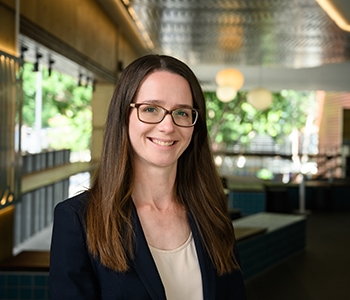
Unravelling breast cancer resistance to radiation therapy using 3D tissue models
Published: 04/30/24 8:25 AM

Laura Bray
Project Description:
Breast cancer ranks as the second most frequently detected cancer in Australia, with over 20,000 diagnosed annually. About 50% of breast cancer patients will receive radiotherapy as one of the methods of treatment. However, it is known that the response to radiotherapy can vary greatly among patients and not all patients benefit equally from radiotherapy t leading to distant metastasis and local recurrence. Hence, there is a need to personalise radiotherapy in the management of breast cancer to achieve optimal results. In this NBCF-funded study, A/Prof Laura Bray (Queensland University of Technology) will grow samples of a patients’ breast cancer, removed following surgery, in a gel-based three-dimensional (3D) culture platform and expose them to various doses of radiation. These 3D models will be assessed pre and post radiotherapy for changes in genes and proteins to identify specific biomarkers that could be used to predict which patient responds well or poorly to radiotherapy.
Why is this work needed:
While radiotherapy is a critical treatment for breast cancer not all patients respond effectively. Hence, there is a need to identify patients who are more likely to benefit from radiotherapy, while sparing those that do not and offer alternative treatments. Currently, there is a lack of relevant and useful preclinical model systems that can be used to evaluate the sensitivity of a patient’s tissue to radiation. This study will develop a preclinical model to find biomarkers that predict individual patient’s response to radiotherapy.
Expected outcomes:
Successful outcomes of this study will reveal molecular biomarkers linked to resistance to radiation and the ability to forecast an individual patient’s sensitivity to it.
This research has the potential to make a marked difference to the radiation treatment a patient receives, ensuring that treatment is tailored to the individual requirements of the patient, providing best clinical outcomes, and reduce mortality from breast cancer.
Project description:
Breast cancer is the second most frequently detected cancer in Australia, with over 20,000 diagnosed annually. About 50% of breast cancer patients will receive radiotherapy as one of the methods of treatment. However, not all patients benefit equally from radiotherapy, some breast cancers are inherently resistant or develop resistance, which can lead to distant metastasis and local recurrence.
Identifying which patients respond well or poorly to radiotherapy could inform a more personalised therapy approach, rather than a “one size fit all” model of treatment.
While there have been notable advances in the development of molecular markers to categorise breast cancer patients for more personalised targeted treatments, comparable improvements in the field of personalised radiotherapy are yet to be realised in the clinic. Currently, there are no clinically validated prognostic or predictive biomarkers that can reliably classify patients into those that would benefit from radiotherapy and those that could potentially be spared and be offered alternative treatment options.
With NBCF support A/Prof Laura Bray aims to grow samples of a patients’ breast cancer, removed following surgery, in a gel-based three-dimensional culture platform and expose the tissues to radiation doses and timing as those used in the clinic. Following treatment, the tissue will be analysed for changes in genes and proteins to identify specific biomarkers that could be used to tailor radiotherapy.
It is envisaged that a personalized approach to radiotherapy will greatly reduce deaths occurring from treatment failures and diminish the possibility of a relapse.